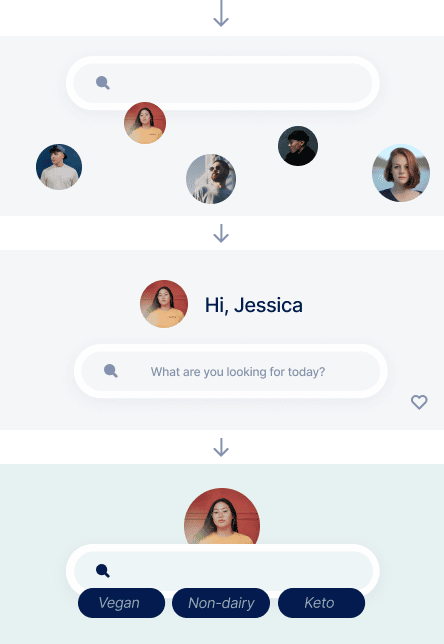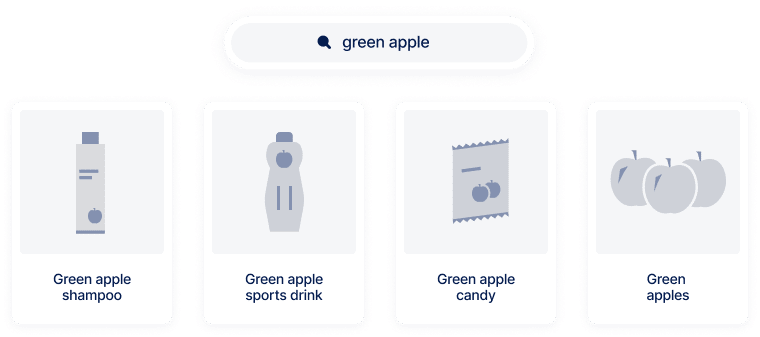
Top brands understand their customer’s unique needs and preferences and dominate their markets by using that knowledge to craft engaging experiences. Think of Spotify, YouTube, Amazon, and Netflix. How does your brand’s customer experience stack up?
The difference between merely providing a list of products and providing an experience is hyper-personalization.
What is Hyper-Personalization?
“[Hyper-personalization is] done by creating custom and targeted experiences through the use of data, analytics, AI, and automation. Through hyper-personalization, companies can send highly contextualized communications to specific customers at the right place and time, and through the right channel.” — Deloitte
The entire ecommerce industry is on a personalization journey.
At the start, we have completely undifferentiated experiences.
At the end, we have perfect knowledge of each user and can provide a completely dynamic experience to achieve the desired result every time.

Most brands haven’t gotten too far yet in this journey. But every step toward greater personalization, each new piece of information we can use, is a new tool to give a better customer experience, leading to more sales and stronger customer loyalty.
Hyper-personalization is when we take bigger steps on that journey, going beyond the basics and discovering the elements that really matter. It’s about learning from every visitor action to provide an experience that speaks to that individual and drives business results.
Increasing Revenue Through Hyper-Personalization
Personalized experiences are table stakes. Hyper-personalized experiences move the needle.
According to Twilio Segment’s State of Personalization 2021 report, 60% of consumers say they will become repeat customers after a personalized retail experience. Additionally, the report found that while 85% of businesses believe they are offering personalized experiences, only 60% of consumers agreed.
So what does this mean?
Brands are overestimating how well their personalization stacks up while they are undervaluing the impact of personalization on their customers.
Four Examples of Hyper-Personalization in Ecommerce
1. Offering personalized shopping experiences based on demographics
This is a broad category, but represents a large portion of what hyper-personalization really means in ecommerce: Making informed decisions about what your individual customers are likely to want, even before they ask.
Core demographic information such as gender, age, and geographical location go a long way in establishing trust, and demonstrating that you understand your customers.
After all, if you walked into a clothing store in Utah in the middle of a harsh winter, asking to see coats and were shown windbreakers that were not in your size or for your gender, you would be understandably confused and frustrated. Why should shopping online be any different?
As visitors spend more time on your site, they are giving you information with each action they take (even before checkout!). Leveraging this information as early and often as possible can pay huge dividends.
2. Automating ecommerce search results with AI and NLP
Ultimately, the barrier to better ecommerce personalization is technology. Creating increasingly dynamic experiences starts in your tech stack. If you aren’t collecting the right data, you won’t be able to provide customized experiences as early or as often as you need to.
Using technologies that employ Artificial Intelligence (AI), Machine Learning (ML), and Natural Language Processing (NLP) are critical. These tools can identify links between actions your visitors take and established outcomes, and make adjustments to the user experience without the need for manual intervention.
For example, let’s say a shopper is looking for Granny Smith apples, but searches “green apples” instead. Most ecommerce search solutions would need manual intervention to show granny smith apples as a top result. Rather, the shopper would find green apple-scented shampoos, sports drinks, and candy as the top results. All these things might have the words green apple in the name but none are what this hypothetical customer is really after.
However, using AI and ML, you can harness conversion data to understand that there is a strong positive link between people searching for “green apples” and purchasing Granny Smith apples, resulting in that search result getting featured.

While this is a simple example, integrated AI solutions can take steps beyond the obvious links and create connections that give truly hyper-personalized experiences, showing your visitors what they are looking for even before they ask.
A great example of this technology at work is Constructor’s clickstream-based product search and discovery platform. Not only can it identify demographics for new and returning visitors, creating hyper-personalized search results and recommendations, but it can analyze each individual’s actions and provide them with results that have the highest potential for a positive outcome.
Here are some of the outcomes this technology can bring.
3. Customizing experiences based on clickstream data
Not all AI-based ecommerce platforms are the same. To create true hyper-personalization in an ecommerce experience, it is important to provide personalization early (before the first checkout) and often.
One way to do this is with clickstream data and ML analysis.
Clickstream data includes visitor actions such as clicks, add to carts, etc. By looking at this data in real time, a clickstream-based product search & discovery platform can show products that are most likely to be attractive to that individual shopper.
For example, let’s say a new visitor on an apparel ecommerce site searches for pants. The site knows nothing about them, starting with a completely blank slate and a very broad search term. The site responds by showing them top-selling pants.
The shopper clicks on a pair of women’s dress pants in tan. Using this click, the system identifies that this customer wants to see women’s clothes, seems to be shopping for office wear, and might have an affinity for the color tan. This information can be processed instantly to show items that are similar, and this clickstream data can be compared to all other visitors to find what shoppers with similar behaviors ended up purchasing.

A robust AI and clickstream-based product search and discovery platform will find these simple connections as well as more complex ones automatically, and provide them without the need for manual intervention.
4. Creating relevant product recommendations
Product recommendations are one of the most obvious places where personalization can shine. However, most ecommerce sites only personalize recommendations that are relevant to the current product viewed and use semantic or tag systems to link products to each other.
Clickstream data can do a much better job. Product recommendations are one of the best places for clickstream data to make an impact. With each click our shopper makes, their recommendations get better and better. This creates an experience where browsing recommendations becomes just as (or even more) powerful as site search.
The shopper started by looking in a broad category, but after just a few clicks the site has identified critical information that might include their size, gender, color and style preferences, and more. This lets the site provide detailed recommendations that know exactly what the customer wants, without them having to be taken out of their organic experience to select product filters manually.
Providing hyper-personalized product recommendations starts with the right data. The full picture of what a visitor needs includes what they have clicked on, what they have searched, and what they have added to cart. This clickstream data can then be interpreted using ML to suggest products that have been shown to be attractive to other customers who made similar actions.
Measuring the Impact of Hyper-personalization
While talking about hyper-personalization strategies, it is important to understand what success looks like. It can be easy to zoom in too much and look at metrics that paint an incomplete or perhaps misleading picture.
For example, focusing on Average Order Value (AOV) can send false signals. Since this metric doesn’t take into account conversion rates, you could have lower overall revenue while AOV is up. For this reason, Revenue per Visitor (RPV) is an excellent primary metric when measuring the value of personalization.
When properly used, hyper-personalization should:
-
Dramatically improve your customer experience, driving loyalty and repeat business
-
Improve purchase satisfaction, leading to fewer returns
-
Improve the KPIs that matter most to your business
-
Provide measurable ROI by not requiring your merchandising teams to engage in taxing manual work to create personalized shopping experiences
In the end, the best rubric for any ecommerce personalization is to ask, “Did it improve the customer experience?” If the answer is yes, it will have a positive impact on revenue as well.
Bringing Hyper-Personalization to Your Brand
The most significant impact a brand can have on a customer is to help them feel that their needs matter and trust that the brand can meet them. Can your customers quickly and easily find what they need on your website? This is the first step for meeting customer expectations and building brand loyalty in 2022.
But in a highly competitive ecommerce space with an increasingly diverse customer base, creating that sentiment becomes harder and harder to do. And it’s simply not possible with a static, “one-size-fits-all” online shopping experience.
This is why hyper-personalization is so critical today. The right AI, machine learning, and natural language processing technologies can yield both a better customer experience and results that meet key business outcomes. Without them, you’re left relying on just personalization—and as customers will tell you, personalization doesn’t feel that special anymore.